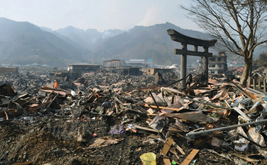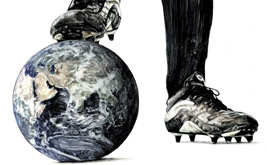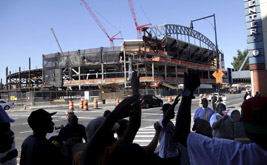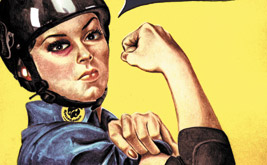
Life After Fukushima Life After Fukushima
Japan’s artists and writers respond to the 3/11 disaster.
Aug 10, 2011 / Feature / Eric Ozawa
In a Motel Room in Chandler, Arizona In a Motel Room in Chandler, Arizona
En route to Los Angeles during the quake, the author finds himself in Arizona, watching the tsunami unfold on TV.
Aug 10, 2011 / Feature / Koji Suzuki
A Man-Made Disaster A Man-Made Disaster
3/11 will go down in history as a day that fundamentally changed the environment of modern Japan.
Aug 10, 2011 / Feature / Hiroshi Senju
Canaries in the Coal Mine Canaries in the Coal Mine
After 3/11, there is no way we can go back to how things used to be.
Aug 10, 2011 / Feature / Banana Yoshimoto
Self-Restraint Self-Restraint
The response by the Japanese people to the quake fills the author with pride—and great concern.
Aug 10, 2011 / Feature / Hitonari Tsuji
Restoring the Time Capsule Restoring the Time Capsule
For those who grew up in Fukushima, the disaster didn't just destroy their home town, it stole their childhood memories.
Aug 10, 2011 / Feature / Hideo Furukawa
The Sports Issue: Views From Left Field The Sports Issue: Views From Left Field
Howard Cosell called it rule number one of the jockocracy—the idea that sports and politics don’t mix. Playing the game, and playing it well, is all that matters. And yet the closer you look, the more it becomes apparent that it’s not sports and politics that “don’t mix.” It’s sports and a certain kind of politics—the politics of protest and resistance. Athletes who speak out on issues of social justice invariably pay a price. It’s a problem that powerful commercial interests control the language of sports, not just because it shuts out alternative perspectives but because sports culture shapes other cultural attitudes, norms and power arrangements. Politics runs rampant throughout the sports world, a broad arena in which struggles for racial justice, gender equality and economic fairness are played out. With stakes this high, we couldn’t sit back and watch as the sports world becomes increasingly dominated by politics from right field. Consequently, we decided to enlist Nation sports correspondent Dave Zirin’s help in planning a special sports issue, only the second in The Nation’s 146-year history, and not coincidentally at a time when two of the country’s major leagues were locking out their employees in fierce labor battles. The following articles and essays will, we hope, address the central areas in which sports culture intersects with the pursuit of social and economic justice. But the world of sports doesn’t just demand our attention; it also fires our imagination. The distinguished group of writers, thinkers and advocates who pay tribute to their favorite sports heroes in these pages express a feeling many of us share: pure love of the game. —The Editors
Jul 27, 2011 / Feature / The Editors

Jocks vs. Pukes Jocks vs. Pukes
Jock Culture is a distortion of sports.
Jul 27, 2011 / Feature / Robert Lipsyte

Why Do Mayors Love Sports Stadiums? Why Do Mayors Love Sports Stadiums?
Numerous cities are littered with “downtown catalysts” that failed to catalyze.
Jul 27, 2011 / Feature / Neil DeMause

Revolution on Eight Wheels Revolution on Eight Wheels
Roller Derby marries an underground vibe with the fun of athletic competition.
Jul 27, 2011 / Feature / Diane “Lady Hulk” Williams
